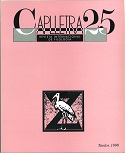La variació lingüística: el fet i la seva significació
DOI:
https://doi.org/10.7203/caplletra.25.6734Palabras clave:
variació lingüística, català Resumen
Resumen
This study is a general presentation of the phenomenon of linguistic variation, from the point of view both of its empirical reality and of its semiotic, linguistic and socio-pragmatic analysis. We distinguish initially between the interest in research into the invariant form, which has characterized strict linguistics, and the orientation of sociolingüístics towards the study of variation; between the
concentration on the referential value of language as an arbitrary symbol and the concentration on the connotative value of language
as an index of social relations; between the limitation on the consideration of category alternation (allophony) and research into
structured variation (sociolingüístic variables); and between variation of a statistical character (such as the ones just mentioned) and variation based on discrete oppositions. The linguistic realities defined by the study of variation—styles, levels of language, natural
varieties, registers—must be described not only in terms internal to the linguistic system but also in their relation to the social and
sociocultural context; this terminological diversity reflects on occasions different linguistic modalities, and on others distinct
methodological approaches, among which we stress the importance of the ethnography.
 Descargas
Descargas
Descargas
Publicado
Cómo citar
-
Resumen528
-
PDF (Català)152
Número
Sección
Licencia
El autor o autora que dirija un trabajo a la redacción de Caplletra para ser publicado tiene que ser la persona titular legítima de los derechos de explotación. La legitimación para la publicación del trabajo tiene que incluir también las imágenes, las tablas, los gráficos y otros materiales que puedan complementar el texto, con independencia de si es su autor o autora.
Copyright. Al publicar el trabajo en la revista, el autor o autora cede a Caplletra. Revista Internacional de Filologia los derechos de explotación (reproducción, distribución y comunicación pública), tanto para la edición impresa en papel como para la versión electrónica.
Todos los trabajos publicados en Caplletra se encuentran bajo una licencia Creative Commons del tipo Reconocimiento-NoComercial-SinObraDerivada 4.0.
RESPONSABILIDAD
Caplletra. Revista Internacional de Filologia no se identifica necesariamente con los puntos de vista sostenidos en los trabajos que publica.Caplletra. Revista Internacional de Filologia declina toda responsabilidad derivada de cualquier vulneración eventual de los derechos de propiedad intelectual que pudiera ser llevada a cabo por los autores o autoras.






